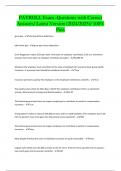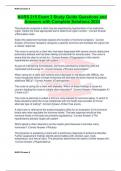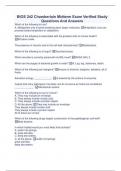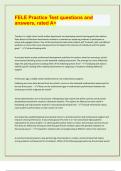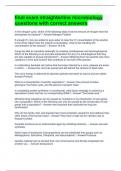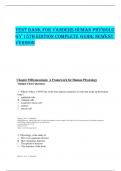John Miller makes clear his Revisionist standpoint on the Glorious Revolution, arguing that it
was extremely innovative in its distribution of power and the relationship between King and
Parliament was transformed. He uses parliament's financial restraint on William, i.e. the
Civil List Act which gave the crown a yearly allowance of £700,000, whilst also requiring him
to ask parliament each year for money for the army and navy, as a prime example. Another
way in which Parliament held control over the monarchy with finance was the scrutiny of
government spending with commissions, led by MPs to expose any corruption in monetary
distribution. However, this was not done against the will of the King, as William had in fact
wanted these commissions in order to increase the efficiency of the war effort: his main goal
being to defeat Louis XIV in France. Although, this led to the Act of Resumption, in which
parliament forced the king to reallocate the land won in Ireland to farmers rather than
political allies – such a violation of the crown’s power of patronage rarely seen before 1688.
Miller also adds that William’s control waned due to legislation passed by parliament during
his reign. He exemplifies the Triennial Act of 1694, which was passed despite William’s veto
years earlier and meant parliament had to be called at least once every three years,
galvanising a rage of party which again jeopardised the king’s power patronage. As well as
this the Act of Settlement was introduced in 1701, which excluded Catholics from the future
throne, but also instated rules on foreigners being able to acquire the crown – a direct
attack on the Dutch King. Also a clear attack on William, a king who came to power primarily
to fight the Nine Years War, was parliaments reduction of the army twice during his reign.
Therefore Miller's argument has sufficient evidence to prove convincing that parliament had
gained new-found power over the Crown after the Revolution.
On the other hand, Steven C A Pincus and James A Robinson I'll give from a quite different
Whig perspective, by stating much of what occurred between King and Parliament following
the Glorious Revolution was ‘no new development’. Although they acknowledge that
parliament was called more frequently after 1688, they refute the idea that it was the
revolution which forced the crown to call parliament regularly. This is down to the vague
nature of the Declaration of Rights, on which the revolution was built upon, as it gave no
mechanisms for the free and frequent elections in parliament, only stating that they should
be allowed to sit. They also claim that this idea was not innovative, and though this be true,
as the Triennial Act had also been instated during Charles I’s reign, Parliament had never
before been so successful in preventing a monarch from exercising personal rule, of which
all in the century had done. Furthermore, Mutiny Bills were newly introduced during
William’s reign, which reinstated the power of parliament as they now had to be called back
yearly as well. The historians also use the fact that financial oversight measures had been
used throughout the century, and so meaning the Revolution Settlement was also a
continuation financially. However, this is not the case, as the new king had become
extremely dependent on parliament, as his loans to support the war effort were
underwritten by parliament – a new concept with the establishment of the Bank of England.
Again, this is especially significant as the war was so important to William. As well as this the
aforementioned Civil List Act contributed greatly to an alteration in the relationship
between parliament and Crown, as parliament now had increased control over William’s
expenditure. So, it can be seen that there are many arguments to oppose that of Pincus and
Robinson that the Glorious Revolution made few changes in the governmental structure,
making this viewpoint fairly unconvincing.
was extremely innovative in its distribution of power and the relationship between King and
Parliament was transformed. He uses parliament's financial restraint on William, i.e. the
Civil List Act which gave the crown a yearly allowance of £700,000, whilst also requiring him
to ask parliament each year for money for the army and navy, as a prime example. Another
way in which Parliament held control over the monarchy with finance was the scrutiny of
government spending with commissions, led by MPs to expose any corruption in monetary
distribution. However, this was not done against the will of the King, as William had in fact
wanted these commissions in order to increase the efficiency of the war effort: his main goal
being to defeat Louis XIV in France. Although, this led to the Act of Resumption, in which
parliament forced the king to reallocate the land won in Ireland to farmers rather than
political allies – such a violation of the crown’s power of patronage rarely seen before 1688.
Miller also adds that William’s control waned due to legislation passed by parliament during
his reign. He exemplifies the Triennial Act of 1694, which was passed despite William’s veto
years earlier and meant parliament had to be called at least once every three years,
galvanising a rage of party which again jeopardised the king’s power patronage. As well as
this the Act of Settlement was introduced in 1701, which excluded Catholics from the future
throne, but also instated rules on foreigners being able to acquire the crown – a direct
attack on the Dutch King. Also a clear attack on William, a king who came to power primarily
to fight the Nine Years War, was parliaments reduction of the army twice during his reign.
Therefore Miller's argument has sufficient evidence to prove convincing that parliament had
gained new-found power over the Crown after the Revolution.
On the other hand, Steven C A Pincus and James A Robinson I'll give from a quite different
Whig perspective, by stating much of what occurred between King and Parliament following
the Glorious Revolution was ‘no new development’. Although they acknowledge that
parliament was called more frequently after 1688, they refute the idea that it was the
revolution which forced the crown to call parliament regularly. This is down to the vague
nature of the Declaration of Rights, on which the revolution was built upon, as it gave no
mechanisms for the free and frequent elections in parliament, only stating that they should
be allowed to sit. They also claim that this idea was not innovative, and though this be true,
as the Triennial Act had also been instated during Charles I’s reign, Parliament had never
before been so successful in preventing a monarch from exercising personal rule, of which
all in the century had done. Furthermore, Mutiny Bills were newly introduced during
William’s reign, which reinstated the power of parliament as they now had to be called back
yearly as well. The historians also use the fact that financial oversight measures had been
used throughout the century, and so meaning the Revolution Settlement was also a
continuation financially. However, this is not the case, as the new king had become
extremely dependent on parliament, as his loans to support the war effort were
underwritten by parliament – a new concept with the establishment of the Bank of England.
Again, this is especially significant as the war was so important to William. As well as this the
aforementioned Civil List Act contributed greatly to an alteration in the relationship
between parliament and Crown, as parliament now had increased control over William’s
expenditure. So, it can be seen that there are many arguments to oppose that of Pincus and
Robinson that the Glorious Revolution made few changes in the governmental structure,
making this viewpoint fairly unconvincing.

